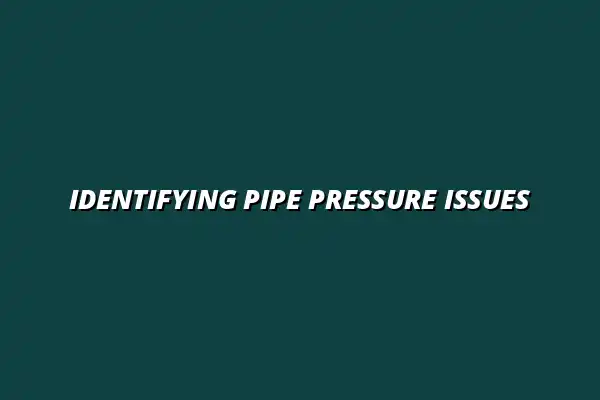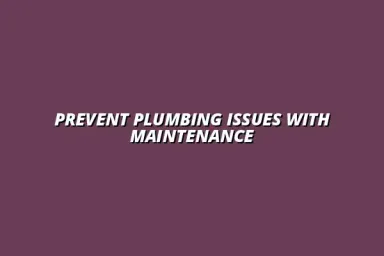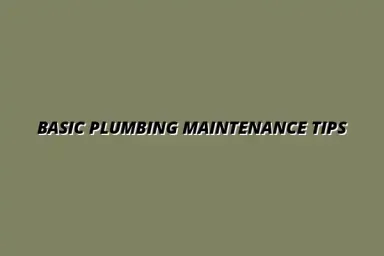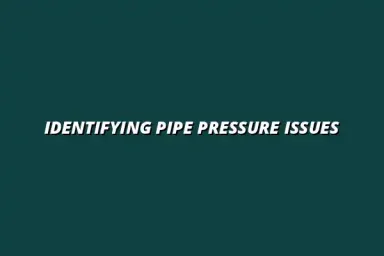Understanding Pipe Pressure Problems and Their Implications
When it comes to plumbing, one of the crucial aspects is pipe pressure. Understanding pipe pressure problems can save you from unexpected leaks, water damage, and costly repairs. In this article, we'll dive into what these issues are, why they matter, and how to identify them.
Defining Pipe Pressure Issues and Their Importance
What Are Pipe Pressure Problems?
Pipe pressure problems occur when there’s an imbalance in the water pressure within your plumbing system. This can mean either too much pressure, leading to potential bursts, or too little pressure, causing inadequate water flow. Recognizing these issues early can prevent bigger headaches down the line!
Additionally, understanding the basics of pipe pressure can empower homeowners. This knowledge helps you communicate better with plumbers and make informed decisions. Plus, it can lead to a more efficient plumbing system overall. For example, learning how to prevent bathroom water pressure problems can save you significant frustration and expense.
Why Addressing Pipe Pressure Matters to Your Plumbing System
Addressing pipe pressure is essential for maintaining a healthy plumbing system. If left unchecked, pressure problems can lead to damage not only in your pipes but also in your appliances. For instance, dishwashers and washing machines often rely on consistent water pressure to function correctly.
- Prevents leaks and burst pipes.
- Ensures appliances run efficiently.
- Maintains water quality and flow.
Taking the time to understand and rectify pressure issues means investing in your home’s longevity. The sooner you address these problems, the less likely you’ll face costly repairs in the future!
Common Causes of Pipe Pressure Problems
Clogs and Blockages: A Key Contributor to Pressure Variations
One of the most common culprits of pipe pressure issues is clogs and blockages. These can occur due to various reasons, like food residues, grease buildup, or hair. When these materials accumulate, they restrict water flow, causing pressure to drop in certain areas. A particularly common problem is slow draining bathroom pipes.
Moreover, blockages can lead to more significant problems, such as pipe bursts and leaks if not addressed promptly. Regular maintenance is vital to keep your pipes clear and pressure stable!
Leaky Pipes and Their Impact on Pressure Levels
Leaky pipes can significantly alter water pressure within your plumbing system. Even a small leak can lead to noticeable drops in pressure, making taps and showers less effective. It’s essential to locate and fix leaks quickly to avoid further damage!
- Monitor water bills for sudden increases.
- Inspect for wet spots on walls or ceilings.
- Listen for dripping sounds near pipes.
By being vigilant and addressing leaks, you can maintain a stable water pressure and protect your home from water damage. For issues with older pipes, consider reading up on old pipes and water pressure issues.
Temperature Fluctuations and Their Effects on Pipe Pressure
Temperature changes can also impact pipe pressure. For example, cold weather can cause pipes to contract, leading to reduced water flow. Conversely, hot weather can expand pipes, causing pressure to increase.
Understanding how temperature affects your plumbing system helps you anticipate and respond to potential pressure issues. Keeping an eye on seasonal changes can prepare you for adjustments needed in your pipe management!
Identifying Signs of Pipe Pressure Problems
Recognizing Low Water Pressure Issues in Your Home
Low water pressure can be frustrating. You might notice weak showers or slow-filling toilets. It’s essential to recognize these signs early to determine the root cause, whether it’s a clog or an issue further down the line. If your kitchen is experiencing low pressure, check out these tips for fixing low kitchen water pressure.
- Check if multiple faucets show low pressure.
- Look for slow drainage in sinks and tubs.
- Inspect appliances for performance issues.
By identifying low water pressure quickly, you can take steps to restore normal function and avoid inconvenience.
Signs of High Water Pressure and Potential Risks
On the other hand, high water pressure can be just as concerning. You may hear loud banging noises in your pipes or notice water spraying from fittings. This can lead to wear and tear on your plumbing system, making it crucial to address immediately!
Some signs of high water pressure include:
- Frequent leaks at joints and fittings.
- Water hammering sounds when turning faucets on/off.
- Appliances malfunctioning due to excessive pressure.
Monitoring your water pressure can save you from costly repairs and maintain the integrity of your plumbing system. Addressing low water pressure in your water heater is covered in this guide on fixing low water pressure in heaters.
Unusual Noises as Indicators of Pressure Problems
Unusual noises in your plumbing system can be a significant indicator of pressure problems. Sounds like gurgling, hissing, or banging can suggest that pressure isn’t where it should be. These indicators shouldn’t be ignored, as they often signal underlying issues that need attention.
Listening carefully for these noises can help you catch problems early and prevent further damage. Regularly checking your plumbing system ensures you stay ahead of potential pressure issues!
Strategies for Addressing Pipe Pressure Problems
Addressing pipe pressure problems requires both immediate and long-term strategies. By understanding how to tackle these issues, you can maintain optimal performance in your plumbing system. Let's explore some effective solutions that can help you manage pipe pressure more efficiently!
Immediate Solutions for Common Pipe Pressure Issues
When faced with sudden pipe pressure problems, quick action can save you from bigger headaches down the line. Here are some immediate solutions you can take to restore normal pressure levels:
- Clearing Clogs: Use a plunger or a plumber's snake to remove blockages in your pipes.
- Flushing the System: Sometimes, flushing your plumbing system can help eliminate any disruptions in flow.
- Checking Valves: Ensure that all valves are fully open to allow unrestricted water flow.
Clearing Clogs and Restoring Normal Pressure Levels
Clogs are a major culprit behind pressure drops in your plumbing. By effectively clearing clogs, you can often restore pressure without further complications. Here are some methods to consider:
- Use Hot Water: Pouring hot water down your drains can help dissolve grease and soap buildup.
- Utilize Chemical Drain Cleaners: For stubborn clogs, chemical drain cleaners may be effective, but use them sparingly.
- Professional Services: If DIY methods fail, call a plumber for expert help in clearing blockages. For example, a plumber in Billesley, Birmingham can be found here: Plumber in Billesley, Birmingham.
Repairing Leaks and Enhancing Pipe Integrity
Leaks can severely impact your pipe pressure and lead to further damage if not addressed swiftly. Fixing leaks can not only enhance the integrity of your pipes but also help maintain steady water pressure. Some steps to take include:
- Identifying Leak Locations: Begin by checking for damp spots or water accumulation around your home.
- Using Pipe Sealants: For small leaks, a pipe sealant can be an effective quick fix.
- Replacing Damaged Sections: If leaks are frequent, it might be time to replace the compromised sections of your pipes.
Long-Term Solutions for Preventing Future Issues
While immediate fixes are essential, long-term solutions are crucial for maintaining a healthy plumbing system. Here’s how you can prevent future pipe pressure problems:
- Regular Inspections: Schedule routine checks to catch potential issues early.
- Proper Drainage: Ensure that your drainage system is functioning efficiently to prevent buildups.
- Invest in Quality Materials: The right materials can reduce the risk of leaks and pressure drops.
Implementing Regular Maintenance Routines
One of the best ways to ensure a well-functioning plumbing system is by establishing a regular maintenance routine. Doing so can help you catch small issues before they turn into costly repairs. Here’s what to include in your routine:
- Monthly Checks: Inspect taps and pipes for visible wear or leaks.
- Annual Professional Inspections: Hire an expert for a thorough plumbing inspection every year.
- Maintain Accessibility: Ensure that all plumbing fixtures are easily accessible for maintenance. For tips on maintaining optimal water pressure, see this guide on maintaining optimal water pressure.
Understanding the Importance of Pipe Material Choices
The materials used in your plumbing can greatly influence pipe pressure and durability. Choosing the right materials is key to preventing future problems. Consider these factors when selecting pipe materials:
- Corrosion Resistance: Materials like PVC and copper resist corrosion and can prolong pipe life.
- Pressure Ratings: Ensure that the materials you choose are rated for the pressure levels expected in your home.
- Local Codes and Standards: Always check for compliance with local plumbing codes when selecting materials.
Frequently Asked Questions About Pipe Pressure Problems
Understanding pipe pressure problems is essential for every homeowner. Below are some common concerns regarding pipe pressure management, along with expert recommendations.
Common Concerns Regarding Pipe Pressure Management
How Do I Know If My Home Has Pipe Pressure Problems?
Knowing the signs of pipe pressure problems can save you from extensive repairs. Here are some indicators to look for:
- Unusual fluctuations in water flow.
- Frequent leaks in plumbing fixtures.
- Water pressure that feels weak or inconsistent.
- Unexplained increases in your water bill.
What Are the Risks of Ignoring Pipe Pressure Issues?
Ignoring pipe pressure problems can lead to severe consequences. Here are a few risks to keep in mind:
- Potential water damage to your property.
- Increased risk of pipe bursts and flooding.
- Higher water bills due to leaks and inefficiencies.
- Long-term deterioration of plumbing systems.
Expert Recommendations for Homeowners
When to Seek Professional Help for Pipe Pressure Problems
If you suspect serious issues with your plumbing, knowing when to call a professional can save you time and money. Consider reaching out if:
- You notice persistent leaks despite your attempts to fix them.
- Pressure problems occur in multiple areas of your home.
- You’re unsure about diagnosing the issue.
DIY Solutions vs. Professional Interventions: What to Consider
When deciding between DIY fixes and calling a plumber, think about the following:
- Your comfort level with plumbing repairs.
- The complexity of the problem at hand.
- Potential costs associated with further damage from a DIY approach.
Final Thoughts on Pipe Pressure Management
Managing pipe pressure is essential for the health of your plumbing system. By understanding how to identify and address issues, you can maintain consistent pressure and avoid costly repairs!
Summarizing Key Takeaways on Identifying and Addressing Issues
To summarize, here are key takeaways for managing pipe pressure:
- Be proactive in identifying signs of pressure problems.
- Regular maintenance can prevent future issues.
- Invest in quality materials for your plumbing system.
Emphasizing the Importance of Proactive Maintenance
Proactive maintenance is your best defense against pipe pressure problems. Regular checks can help catch issues before they escalate, ensuring lasting performance of your plumbing system. So don't wait; start today!
Encouraging Readers to Monitor Their Plumbing Systems Regularly
Monitoring your plumbing system regularly helps you stay ahead of potential issues. Keep an eye out for changes in pressure and be ready to act if something seems off. Your home will thank you for it!

 Kiran Almasi
Kiran Almasi

